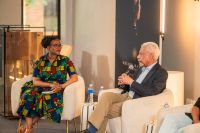On Thursday the 26th of September, the Nelson Mandela Foundation hosted the final installation of our Critical Dialogue Series titled ‘Where Do Africans Belong?’ On the panel was Nobel Literature Prize Laureate, Professor Abdulrazak Gurnah, poet and writer, Maneo Mohale and Bekkersdal community representative, Imam Vuyo Mokoena. The discussion was facilitated by Dr Sebabatso Manoeli-Lesame, Executive Director of the Atlantic Fellows for Racial Equity.
In setting the scene, Dr Sumaya Hendricks, Head of Dialogue and Advocacy at the Foundation, encouraged authenticity above performativity. She invited the panel and attendees to engage with honesty in a conversation that traversed issues of xenophobia, migration, identity and land to unpack contemporary notions of belonging for African communities both locally and globally.
A moment of silence was held in solidarity with the peoples of Sudan and the Democratic Republic of Congo who, particularly over the last year, have experienced indescribable violence and displacement. Samantha Mashapa, Dialogue Analyst at the Foundation, then subverted the tendency to sit in pitying afro-pessimism and hopeless complicity, and rightly commanded us to “believe deeply in the humanity of Black people, [to] believe in the capacity of Black people to achieve and realise their worthiness of love.”
To root the conversation in the broader theme of ‘realizing our shared humanity’, Dr Sebabatso opened with Terence Knew, citing ‘I am human, and nothing human is alien to me.’ This warmed me but left me pondering - what could we possibly concretise from so broad a discussion, in such an urgently inhospitable economy? How can we more strategically deploy and operationalise Africanness to produce belonging?

Dr Sebabatso Manoeli-Lesame and Abdulrazak Gurnah.
Connections between Economics, Xenophobia and Migrant Identity
Imam Vuyo spoke to the experience of immigration into South Africa. He noted how economic realities and conditions in other African countries and South Africa’s ability and willingness to absorb immigrant communities play key roles in fueling increasingly desperate waves of immigration. He highlighted how immigrants facing profound economic insecurity often have their identities constructed as exclusively extractive in the countries they migrate to. Yet Imam Vuyo also urged South Africans to attend to our racial biases in our construction of the ‘immigrant,’ pointing out that much of our biases stem from our own histories of dispossession. Here we should not forget that about 70% of private land in South Africa remains white-owned.
The beauty of being in conversation with someone like Prof Gurnah is his offer of temporal framing: a constant reminder that whatever is now, is not what it was before. In this case, how we constitute belonging has changed over time and will continue to change. To Imam Vuyo’s point, Prof Gurnah highlighted that, over the decades spanning from before his own childhood to now, in Zanzibar and around the world, we have indeed experienced a ‘racialization of belonging and a racialization of nationality’.
Expansive understandings of identity
In their contributions to the discussion, Maneo highlighted the power that resides in developing more expansive understandings of identity that transcend the limits of the colonial and the scriptural. Echoed by Gurnah was the sentiment that, for many, identity and belonging are not rigid and fixed and are instead continuously being constructed. Using the example of migration along Africa's east coast and the evolution of the Swahili language, Gurnah added to this by saying that the coming and going or flow of people is part of life in very concrete ways. Picking up on the metaphor of fluidity, Maneo reminded us that water does not know borders, thus inviting us to understand the collective power in seeing identity as a tool for connection.
Professor Njabulo Ndebele, from the audience, summed up the power in connection and plurality in saying that he feels that he is part of every place that he has lived - “I belong beyond just the place of my birth. The fact that you are moved does not remove you from where you have been.”
Hard Questions
One attendee prompted deeper introspection by asking ‘What will give meaning to our claimed identities and claimed humanity?’ Dr Sebabatso’s final question to panelists furthered the reflection on meaning and action by asking ‘How can we disentangle ourselves from the violence [of colonial legacies]?’.
As we seek to realise our shared humanity, how can we address the harmful effects of local austerity measures and militarization in African countries? Additionally, as we observe the negative consequences of failed multilateral cooperation and the inconsistent protection of human rights, how can we avoid using identity as a weapon against immigrants but rather use African identity as an opportunity for connection?
In a response that stuck with me because it was not trying to answer the unanswerable, but rather energise and locate belonging as a lived exercise in collective power, Maneo gently but firmly reminded us, in the words of Ruth Wilson Gilmore, to ‘find your people and organize.’